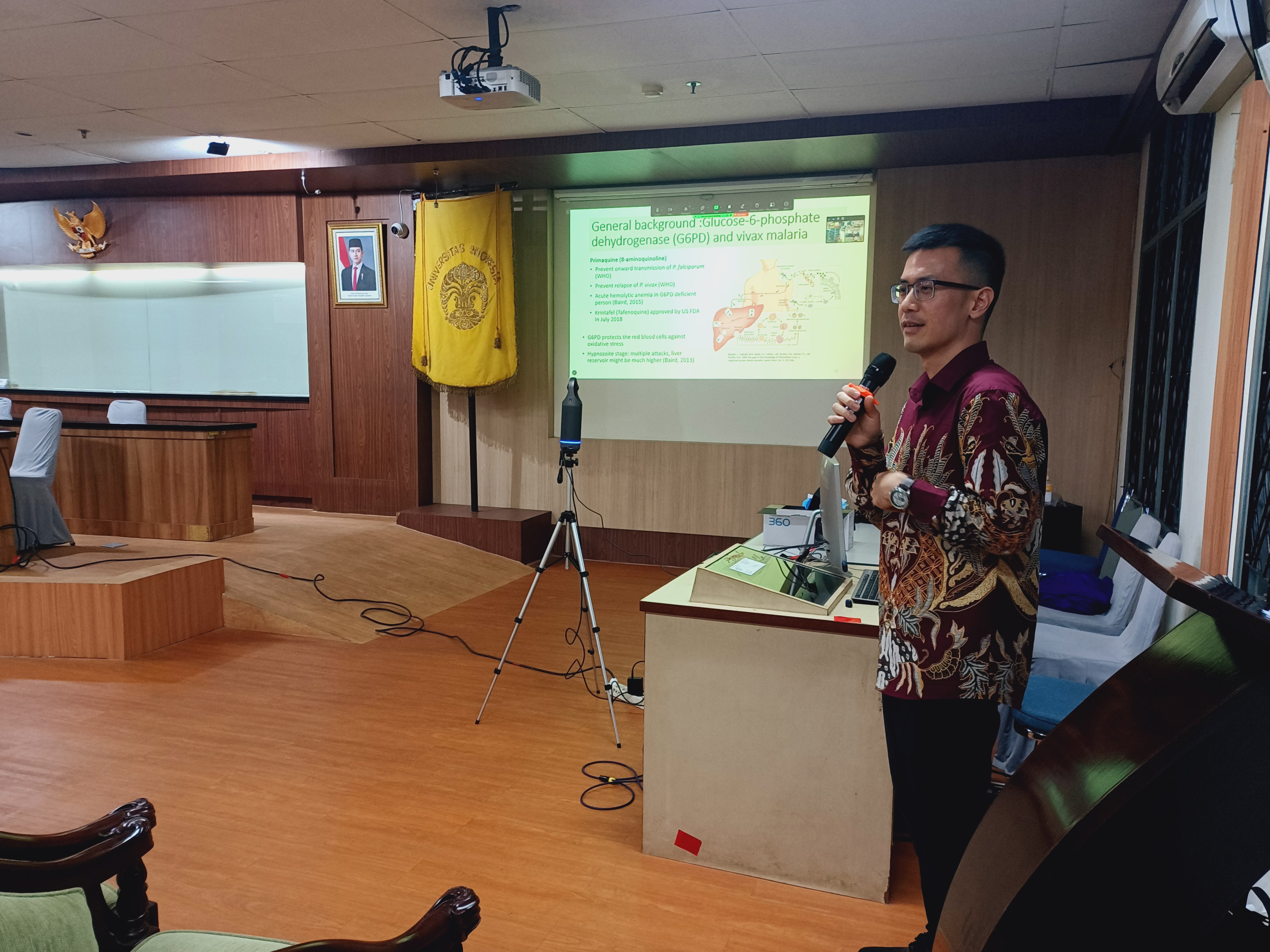The Faculty of Public Health (FPH) at the Universitas Indonesia (UI) hosted a guest lecture by Ken Ong, Ph.D., MHS, Mississippi Delta Scholars in Public Health Teaching Fellow and Postdoctoral Research Fellow at the Department of Epidemiology, Harvard T.H. Chan School of Public Health, during the 30th Online Seminar Series of FPH UI. The topic “Neglected Tropical Diseases and Malaria: Case Studies from the Lao People’s Democratic Republic” was discussed during the seminar, moderated by Rizka Maulida, S.K.M., M.HSc., Ph.D., Secretary of the Master’s Program in Public Health at FPH UI. The seminar, held on December 11, 2024, was successfully conducted in a hybrid format at the Doctoral Promotion Room, Building G, FPH UI, and via Zoom Meeting.
The Vice Dean for Education, Research, and Student Affairs of FPH UI, Dr. Ir. Asih Setiarini, M.Sc., expressed her hope for the seminar’s success in her opening remarks. “This seminar is expected to provide new insights for FPH UI students on neglected tropical diseases and malaria, especially through case studies from the Lao People’s Democratic Republic,” Dr. Asih said. “This discussion is very relevant in efforts to strengthen strategies for the prevention and control of these diseases, both locally and globally,” she added.
During this event, Ken Ong, Ph.D., MHS, gave an in-depth presentation on neglected tropical diseases (NTDs) and malaria. “NTDs are a group of 21 diseases that are preventable and treatable but mostly affect low-income communities,” Ken explained. It is estimated that 1.62 billion people worldwide are affected by at least one NTD, such as dengue fever, leprosy, lymphatic filariasis, and foodborne trematodiasis.
NTDs are diseases caused by various pathogens, such as viruses, bacteria, protozoa, and parasitic worms. These diseases are commonly found in tropical and subtropical areas. NTDs not only cause physical disabilities but also reduce productivity and reinforce the cycle of poverty. In Indonesia, efforts to address NTDs have made progress in line with the World Health Organization’s (WHO) Sustainable Development Goals (SDGs). “The SDG 3.3.5 indicator target is to reduce by 90% the number of people requiring NTD interventions from the 2010 baseline. Back then, Indonesia recorded 157.19 million people needing intervention,” Ken added.
In Laos, foodborne trematodiasis caused by parasites such as Opisthorchis, Clonorchis, Fasciola, and Parogonimus is a significant concern. Chronic infections can lead to severe liver and lung diseases, with liver fluke infection prevalence reaching 80% in endemic villages in Laos. “Although global prevalence data is still limited, preventive chemotherapy using praziquantel or triclabendazole could be a solution,” Ken explained. Thailand has successfully reduced prevalence from 60% to less than 10% through a One Health/Eco Health approach, involving various stakeholders, health education, and treatment since 2007. According to Ken, this success demonstrates the importance of systems thinking, field epidemiology skills, and community engagement in addressing poverty-related tropical diseases. Ken emphasized that relying solely on data-based approaches is not enough because statistics do not always tell the whole story. Community involvement and collaboration between stakeholders are key.
On a global scale, malaria elimination has become a major goal, with full eradication targeted by 2050. In the Greater Mekong Subregion, elimination has been identified as the only acceptable response to the threat of drug-resistant Plasmodium falciparum malaria. Achieving malaria elimination in the Greater Mekong Subregion by 2030 requires an integrated approach, including the use of primaquine with prior G6PD screening. Ken Ong explained that Plasmodium vivax malaria and the glucose-6-phosphate dehydrogenase (G6PD) enzyme have a complex relationship with malaria treatment.
In closing, Ken emphasized the importance of integrating both quantitative and qualitative data in understanding public health issues. “Learning to collect, integrate, and interpret both types of data can help better understand public health problems. However, research is not enough; research findings must be disseminated to create a real impact,” he concluded. He also highlighted that strong policies require effective implementation to achieve success. This seminar became a valuable moment for delving into malaria elimination strategies, particularly in regions with complex endemic challenges. (DFD)

